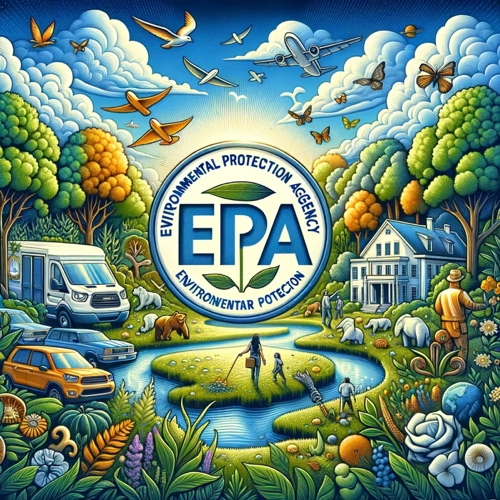Bra podd
Sveriges mest populära poddar

Environmental Protection Agency (EPA) News
EPA Rollbacks Threaten Air Quality and Climate Progress - Key Deadlines for Public Engagement
4 min • 15 augusti 2025
The biggest headline from the EPA this week is the agency’s August 1 proposal to repeal all greenhouse gas emission standards for cars and trucks, dating back to 2012, as well as to rescind the 2009 Endangerment Finding that’s long served as the foundation for regulating climate-warming pollution from vehicles and, by extension, other sources. EPA Administrator Lee Zeldin says this move will cut regulatory costs, support American energy, and deliver on executive orders from President Trump’s first day back in office. In Zeldin’s words, “We’re rolling back senseless regulations and advancing cooperative federalism, keeping America’s engines running and competitive.”
If finalized, this proposal would create a regulatory vacuum for greenhouse gas emissions from vehicles, stripping away mandatory limits that have driven cleaner cars and trucks for over a decade. The agency claims the Clean Air Act wasn’t designed for addressing global climate change and argues that scientific uncertainty and lack of Congressional clarity are reasons to step back. The Department of Energy, doubling down, released a critical report on the impact of greenhouse gases and is now inviting public comment.
For many Americans, these rollbacks could mean more pollution, fewer incentives for electric vehicles, and slower progress on climate priorities. According to the Environmental Protection Network, prior EPA air pollution rules have prevented over 200,000 premature deaths and 107 million asthma incidents since 2021. Environmental and health advocates warn that rescinding these standards will threaten those gains, especially for children, the elderly, and communities near highways. Meanwhile, industries and trade groups—from truckers to small business owners—welcome the changes. U.S. Small Business Administrator Kelly Loeffler estimates the rollback of diesel exhaust mandates alone could save farmers up to $727 million a year.
EPA’s deregulatory push doesn’t stop with transportation. The agency is also moving forward with a risk management phase for formaldehyde, a building-block chemical used across multiple sectors. If you’re a small business affected by formaldehyde regulations in manufacturing, construction, or agriculture, the EPA is seeking your input right now. Self-nominations for the Small Business Advocacy Review panel are open until August 22, with meetings set for this fall.
State and local governments, especially those with ambitious climate goals, may have to navigate a patchwork of standards or step up their own rulemaking efforts. Internationally, the U.S. risks ceding leadership in climate policy, complicating trade and environmental cooperation.
Deadlines to watch: The DOE’s public comment period on its climate impact report will be open for 30 days. Small businesses can submit nominations for the formaldehyde review panel until August 22. And, for those affected by diesel exhaust regulations, new EPA guidance is available now.
Listeners, you can engage by submitting comments on EPA and DOE proposals or nominating yourself for the formaldehyde panel. For more information, check out the EPA’s public engagement pages and stay tuned for updates as legal and legislative challenges shape what comes next.
Thanks for tuning in. Don’t forget to subscribe for more timely briefings on environmental news. This has been a Quiet Please production, for more check out quietplease dot ai.
For more http://www.quietplease.ai
Get the best deals https://amzn.to/3ODvOta
If finalized, this proposal would create a regulatory vacuum for greenhouse gas emissions from vehicles, stripping away mandatory limits that have driven cleaner cars and trucks for over a decade. The agency claims the Clean Air Act wasn’t designed for addressing global climate change and argues that scientific uncertainty and lack of Congressional clarity are reasons to step back. The Department of Energy, doubling down, released a critical report on the impact of greenhouse gases and is now inviting public comment.
For many Americans, these rollbacks could mean more pollution, fewer incentives for electric vehicles, and slower progress on climate priorities. According to the Environmental Protection Network, prior EPA air pollution rules have prevented over 200,000 premature deaths and 107 million asthma incidents since 2021. Environmental and health advocates warn that rescinding these standards will threaten those gains, especially for children, the elderly, and communities near highways. Meanwhile, industries and trade groups—from truckers to small business owners—welcome the changes. U.S. Small Business Administrator Kelly Loeffler estimates the rollback of diesel exhaust mandates alone could save farmers up to $727 million a year.
EPA’s deregulatory push doesn’t stop with transportation. The agency is also moving forward with a risk management phase for formaldehyde, a building-block chemical used across multiple sectors. If you’re a small business affected by formaldehyde regulations in manufacturing, construction, or agriculture, the EPA is seeking your input right now. Self-nominations for the Small Business Advocacy Review panel are open until August 22, with meetings set for this fall.
State and local governments, especially those with ambitious climate goals, may have to navigate a patchwork of standards or step up their own rulemaking efforts. Internationally, the U.S. risks ceding leadership in climate policy, complicating trade and environmental cooperation.
Deadlines to watch: The DOE’s public comment period on its climate impact report will be open for 30 days. Small businesses can submit nominations for the formaldehyde review panel until August 22. And, for those affected by diesel exhaust regulations, new EPA guidance is available now.
Listeners, you can engage by submitting comments on EPA and DOE proposals or nominating yourself for the formaldehyde panel. For more information, check out the EPA’s public engagement pages and stay tuned for updates as legal and legislative challenges shape what comes next.
Thanks for tuning in. Don’t forget to subscribe for more timely briefings on environmental news. This has been a Quiet Please production, for more check out quietplease dot ai.
For more http://www.quietplease.ai
Get the best deals https://amzn.to/3ODvOta
Senaste avsnitt
00:00 -00:00